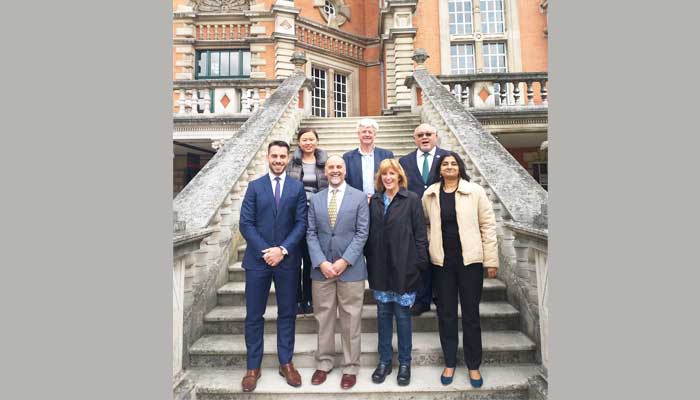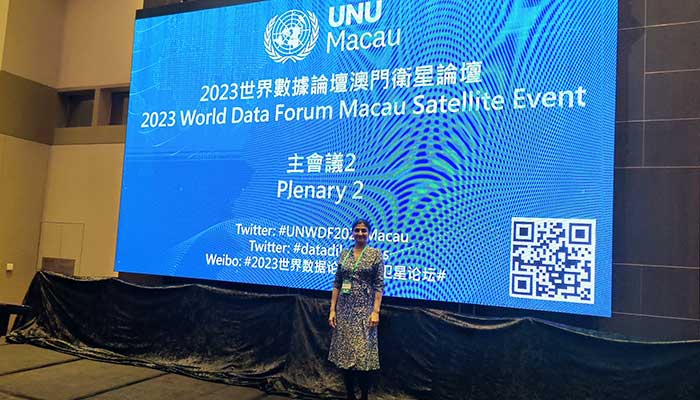Having served as member of the Advisory Board to the UNU Institute in Macau since 2019, Prof. Nimmi Rangaswamy has been elevated to the Chair of the Board effective January 2024.
Prof. Nimmi Rangaswamy calls herself a social anthropologist first and tech professional later. As a professor who kickstarted her career in industry, she is at ease straddling social science and AI in an academic setting. “I study and teach Human Computer Interaction (HCI) from an anthropological perspective,” she explains. Since 2019, she has been on the international Advisory Board of the United Nations University Institute in Macau, along with other distinguished members drawn from diverse backgrounds. Terming her elevation to Chair of the Board as “big shoes to fill in” from her predecessor, Prof. Tim Unwin – an academic who wears many hats that include but is not limited to being the founding Chairholder of UNESCO ICT4D, former Chair of Intellectual Leadership Team, DFID- World Bank Technology for Education Hub, Co-founder of TEQtogether and so on – Prof. Rangaswamy looks back on the last five years as Board member while sharing her vision as the newly minted Chair.
The UNU
When we think of the United Nations, by extension we include its family of organisations, agencies, programmes, funds and convention secretariats. One such institution is a think tank headquartered in Japan – the UN University that also doubles as a post graduate academic organisation. Interestingly it was proposed by the then UN Secretary General U Thant in 1969 as a means of using research and education to resolve global social and welfare issues. The difference however between any other academic university and the UNU is that in the latter, all research is undertaken with a policy framework in mind. “The UNU believes that the UN umbrella is powerful enough to influence policy especially for the marginalised world. With that in mind, it undertakes 3 things primarily – original research, offering postgraduate degrees for capacity building, and raising funds – all towards a single-minded goal of impacting policy,” says Prof. Rangaswamy.
UNU Institutes
The UNU consists of 13 institutes spread across 12 countries. Recognising the immense potential for development and fast tracking progress on achieving SDGs through technology, the Institute in Macau is focused on research and training on digital technologies. “It was during my tenure as board member that the Institute underwent a name change with the inclusion of Macau in its name,” says the professor. Originally established in 1992 as the United Nations University International Institute for Software Technology (UNU-IIST), the Institute in Macau boasts of a multi-disciplinary research team and professors who offer training in ‘Ethics of AI’, ‘Computational Behavioural Science’, ‘Digital Behaviour and Wellbeing’ and so on.

Advisory Board
“As members of the Advisory Board which consists of an eclectic bunch of people – academics, industry persons, policy makers and so on, one important role of ours is to strengthen the academic research capabilities. So, we are part of the recruitment process of researchers and other professors. But it’s not limited to just interviewing candidates; we also help connect them with potential candidates. Other connections we help in making are with partners who can fund us. For instance, we help in applying to various foundations and other organisations so that we can build financial bursaries. Another big agenda is on how to position UNU Macau to the outside world not only to attract great talent but to get our research noticed,” notes Prof. Rangaswamy. She goes on to add that an alignment of administrative goals with those of the research arm is also on the Board’s agenda. “What happens seamlessly in a traditional research institute is sometimes at odds in the UNU. We try to get them on the same page,” she avers.
Chair Of The Board
Apart from directly engaging with the institute and listing issues to be addressed in the Board meetings, one of the responsibilities of the chair includes following up on the suggestions and advisory given to the institute. “The UNU Institute in Macau is actively looking at AI that has societal impact and funds other nodal universities working in this area. IIITH with its emphasis on AI for social good, can be a node working in partnership with UNU Macau where they can undertake joint research projects. As a chair, I can identify opportunities where people can apply and perhaps go there for a year on a sabbatical,” signs off Prof. Rangaswamy.
February 2024

